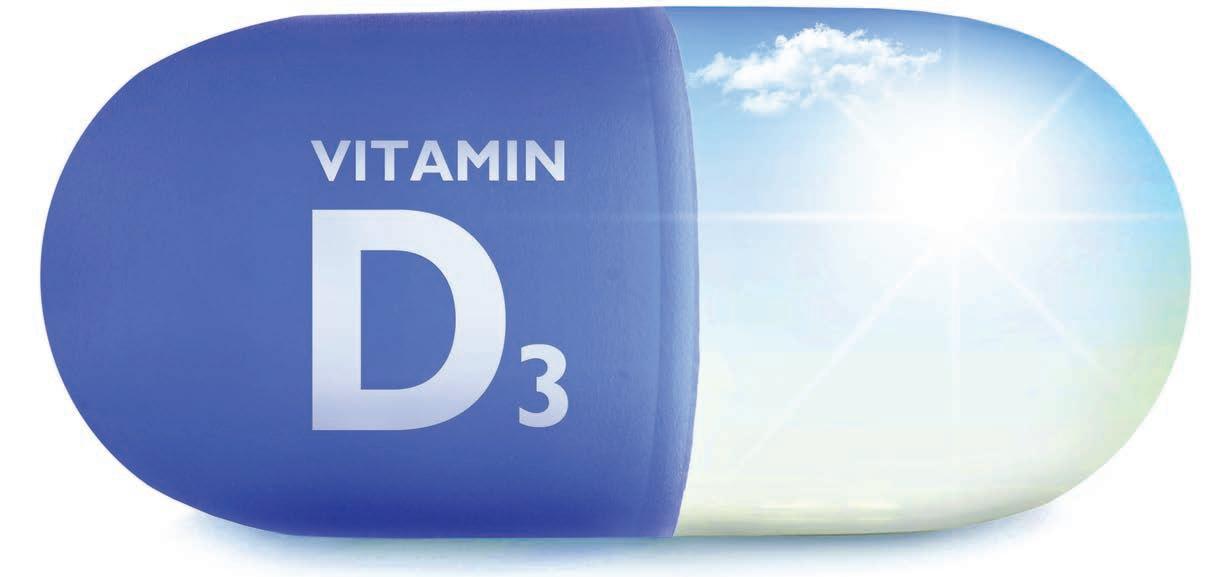
5 minute read
Health & Science
THERE are signi cant di erences between how vitamin D2 and vitamin D3 supplements a ect our health and well-being, according to a new study. e ndings, published in the journal Frontiers in Immunology, suggests that vitamin D3 may be more e ective at strengthening the immune system compared to vitamin D2.
Vitamin D generally comes in two main forms: ergocalciferol (vitamin D2) and cholecalciferol (vitamin D3). Prior research has established vitamin D3 supplements are much more e ective at raising a person’s blood levels of vitamin D. However, it is unclear whether there is any functional di erences to human health between the two types of vitamin D supplements.
Advertisement
To help ll this gap in the knowledge the new research looked at data from a recently completed double-blind, placebo- controlled clinical trial that compared the e ects of vitamin D2 and vitamin D3 supplements in several hundred healthy women. A previously published study reported on the trial’s main results, a rming 12 weeks of vitamin D3 supplementation was more e ective at raising blood levels of vitamin D. e new investigation looked at the di erences between the two forms of vitamin D on gene expression. In general, the researchers detected signi cant di erences in gene expression between the vitamin D2 and vitamin D3 groups.
“Notably, following vitamin D3 supplementation, the majority of changes in gene expression re ected a down- regulation in the activity of genes, many encoding pathways of the innate and adaptive immune systems, potentially shifting the immune system to a more ‘tolerogenic’ status,” the researchers wrote in the new study.
“Surprisingly, gene expression associated with type I and type II interferon activity, critical to the innate response to bacterial and viral infections, di ered following supplementation with either vitamin D2 or vitamin D3, with only vitamin D3 having a stimulatory e ect.”
Colin Smith, lead author on the study, said reduced type 1 interferon signalling has been linked to increased susceptibility to viral infections. So he hypothesises vitamin D3 may be more e ective than vitamin D2 at strengthening immune responses against viruses.
“We have shown that vitamin D3 appears to stimulate the type I interferon signalling system in the body - a key part of the immune system that provides a rst line of defence against bacteria and viruses,” Smith said. “ us, a healthy vitamin D3 status may help prevent viruses and bacteria from gaining a foothold in the body.” e study does note that these ndings indicate vitamin D supplementation is likely to only have bene cial e ects on viral infection if levels are bolstered prior to any viral exposure as it is unlikely there is clinical bene t in vitamin D supplementation after a viral infection takes hold. Recent studies looking at the neutral e ects of vitamin D treatment for hospitalised Covid-19 patients back up these ndings. e study also found the two forms of vitamin D resulted in opposing e ects on some gene expression pathways. In some people taking vitamin D2, circulating vitamin D levels were lower than levels seen in the placebo group after the 12-week trial nished. e researchers hypothesise vitamin D2 may have the potential to deplete or counteract some bene cial e ects of vitamin D3.
“Since some pathways appear to be regulated speci cally by vitamin D3, or in some cases, in opposing directions by vitamin D3 and D2, future studies should investigate whether vitamin D2 supplementation might counteract some of the bene ts of vitamin D3 on human health,” the researchers write.
Study co-author Susan Lanham-New is calling for urgent investigations into the functional di erences between the two forms of vitamins to better clarify what is going on. But, in the immediate term, she suggests vitamin D3 should be the preferred form of vitamin D supplement for most people.
“While we found that vitamin D2 and vitamin D3 do not have the same e ect on gene activity within humans, the lack of impact we found when looking at vitamin D2 means that a larger study is urgently required to clarify the di erences in the e ects,” she said. “However, these results show that vitamin D3 should be the favoured form for forti ed foods and supplements,” said Ms Lanham-New.

PATIENTS with advanced prostate cancer may be giving back some extra years of living, more of a healthy life and have the overall risk of death reduced by a third. Following a breakthrough in treatment.
According to e Daily Mail, the regime involves two standard therapies alongside a powerful new hormone medication, darolutamide. e new drug has already proved to be e ective as a standalone treatment in the earlier stages of the disease, when given to men who have stopped responding to other medications.
But a pivotal trial has now shown that when combined with standard therapies, it also has a dramatic e ect in patients whose cancer has spread throughout the body.
Although a cure isn’t possible for these men, using darolutamide, chemotherapy and other hormone medicines reduced pain, slowed the progression of the disease and extended survival. e men on the trial were mostly in their late 60s, although one patient was 89. ose given the new combination therapy went for four years before their cancer began to progress, while in patients given the standard treatments alone their cancer worsened after just six months.
Professor Alison Birtle, consultant clinical oncologist at Lancashire Teaching Hospitals NHS Foundation Trust, called the advance “exciting”. She said: “We’ve never had the option of a triple therapy like this before.” is study provides a compelling argument to adding darolutamide to standard chemo and hormone treatment, as it will help men with advanced prostate cancer live longer, healthier lives, with less pain. ere are roughly 52,000 new prostate cancer cases every year in the UK.
For those men with earlierstage disease, surgery is typically o ered to remove the prostate – and tumour within – in the hope of a cure.
If they reject surgery, which men often do as the procedure can lead to incontinence and erectile dysfunction, they are o ered drugs to limit the amount of the male hormone testosterone they produce, which prostate cancers use to grow.
In 15,000 men a year the disease has already spread by the time they are diagnosed – and in many cases surgery is pointless. Instead, chemotherapy, radiotherapy and hormone drugs shrink tumours and keep the disease at bay for as long as possible. But in incurable cases, most patients eventually become resistant to standard hormone drugs.










